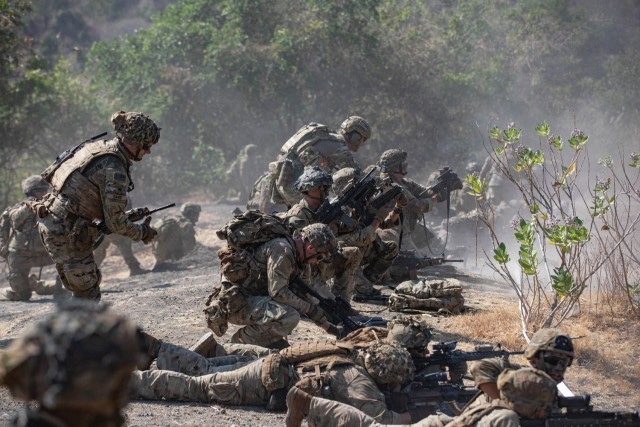WASHINGTON — There are three things that the Chinese military has that the U.S. military, allies and partners in the region do not have, said Army Gen. Charles A. Flynn, commander of U.S. Army Pacific.

“They have interior lines,” he said. He noted that they’re just 100 miles from Taiwan, and they have anti-access, area-denial means to keep opposing forces at a distance — such as missiles, aircraft and ships, as well as cyber and space capabilities.
“The second thing they have is mass,” he said, meaning they have a very large military force.
“The third thing they have is magazine depth,” he said, which would include large quantities of stand-off munitions.
Flynn spoke Tuesday, Oct. 10, 2023, on a panel about land power in the Indo-Pacific region at the Association of the U.S. Army Annual Meeting & Exposition in Washington.
The goal of U.S. forces along with allies in the region is to take time and space away from China to deny them key terrain “and to keep our physical presence forward with hard power to deter a war from happening,” he said.

“The goal is no war. We already have a war in Europe. We have another war that just started this past week in the Middle East. We do not need another war in Asia. That is the land powers’ contribution to the joint force to prevent that from happening,” Flynn said.
The anti-access, area-denial arsenal that the Chinese military possesses “is primarily designed to defeat our air power and maritime power. And, secondarily, it’s designed to degrade, deny and disrupt our space and cyber capabilities. It’s not, however, designed to find, fix and finish distributed, mobile, fixed, semi-fixed, reloadable, lethal and non-lethal land power,” he said.
“We present a dilemma to them that they did not design into the A2/AD arsenal that they built. And this has proven out in war game after war game after war game,” he said, referring to anti-access, area-denial.
The general went on to speak about the importance of the U.S. and allied military presence in the region to deter Chinese aggression.

While air and sea power are crucial, land power is, as well, he said. Flynn added that militaries in the region are composed of anywhere from 65% to 80% ground forces.
“Land power and the armies in the Indo Pacific are an absolute central part of defending [nations’] national sovereignty and protecting their territorial integrity,” he said.
Flynn highlighted steps the U.S., allies and partners are taking to deter China’s aggression, including increased bilateral and multilateral training exercises, the U.S. Army’s new training center in the region, and nations beefing up their defense spending and working together on improving interoperability.
By David Vergun, DOD News

